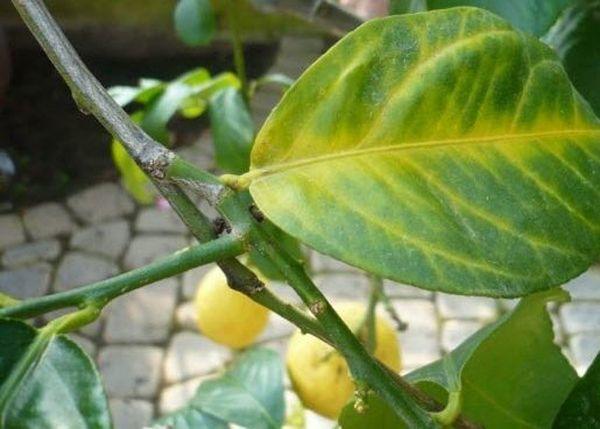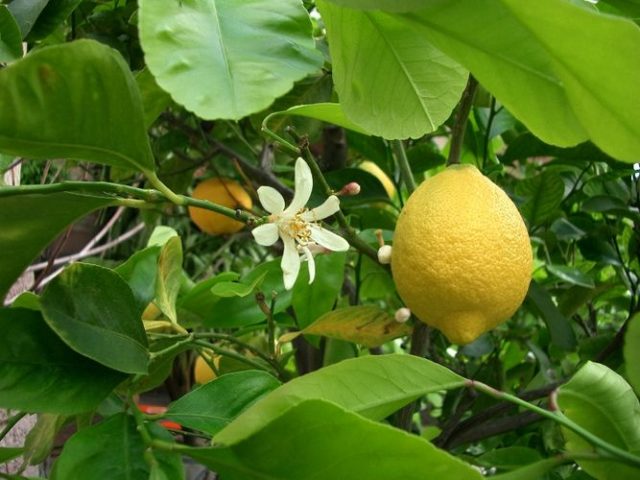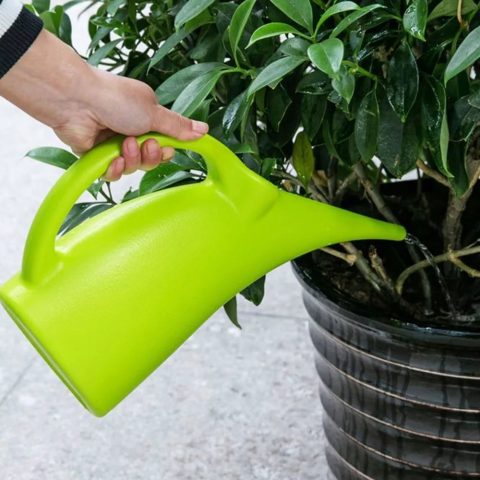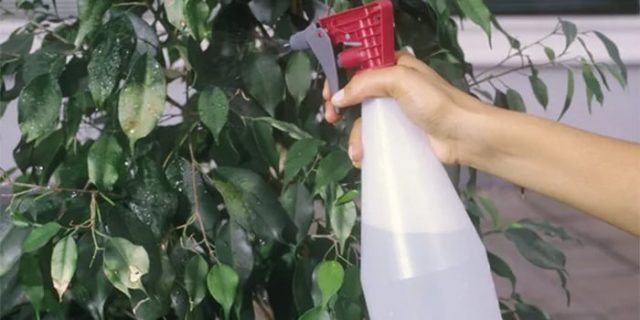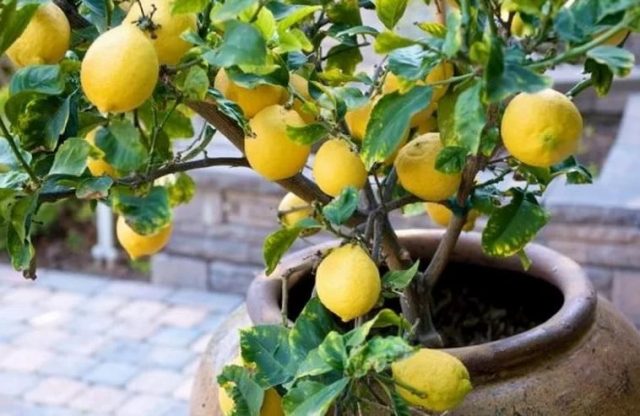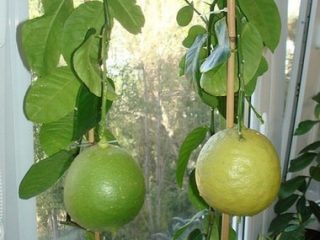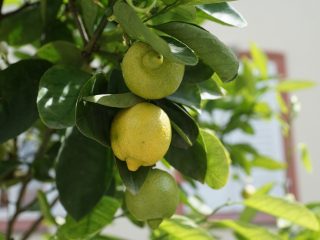Content
Watering is an important part of caring for indoor plants. Moisture entering the soil helps the absorption of nutrients. The root system of citrus crops is designed in such a way that the supply of useful elements from the soil occurs more slowly than that of other plants. Therefore, regular watering is necessary for the full growth of indoor trees. Lemon at home is watered regularly, the full development and formation of fruits depends on this.
The importance of following a watering schedule
Lemon, as one of the leaders in the domestication of citrus crops, is considered an unpretentious plant. Full development at home is possible if you comply with a small list of requirements, which determine: how often to water lemons, what to water them with, when to arrange dormant periods. Watering simultaneously performs several functions:
- helping to obtain nutrients from the soil;
- coordinating evaporation processes;
- stabilization of humidity indicators.
Its development at home depends on following the rules for watering a lemon growing in a pot. Citrus growers recommend establishing a watering schedule at the beginning of cultivation and following it throughout the existence of citrus crops in the house. Excessive irrigation can cause diseases of the root system; drought can lead to the death of the plant. Excess moisture can cause:
- rotting of the root system;
- infection with fungal diseases;
- loss of elasticity of leaves and trunk;
- yellowing, wilting of leaf blades;
- slowing down the growth process;
- preventing fruiting.
The lack of moisture in indoor plants can be easily determined by the condition of the upper layers of the soil. Dry lumps of earth begin to harden, the surface cracks. The above-ground part reacts to drought in its own way:
- the tips of the leaves dry out;
- the plant turns yellow;
- the ovaries fall off;
- trees are unable to produce and form fruits.
Regular watering errors lead to the loss of the lemon's natural defense mechanisms, making it weak and vulnerable.
How to water indoor lemon
Tap water is not suitable for irrigation because it is too hard and may contain high levels of chlorine. Melt or rain water is the best option for citrus fruits. During the period when it is impossible to collect it, citric acid is added to tap water. This helps soften the water and improve its quality. For 10 liters of water add 1 tbsp. l acid.
How to water a lemon to make it bear fruit
The main task of those who grow lemons is to bring the tree to stable and productive fruiting.The trick to caring for a lemon tree is to add additional nutrients at the time of watering. This technique helps to adjust the feeding schedule, protect the tree and increase strength for further flowering and fruit formation.
Hybrid varieties have a root system that has almost no thin conductive hairs capable of absorbing microparticles from the soil. Their absorption of nutrients is slow, so regular feeding is considered the key to full growth.
During the stage when the tree has flowers, ovaries, and partially ripened fruits, the root system needs additional nutrition to meet the needs of the plant.
Citrus growers use wood ash as a way to feed the plant with phosphorus, potassium and calcium. For this, 1 tbsp. l. ash is diluted in 1 liter of water. You need to water the lemon with this solution no more than once every 2 weeks. Ammonium nitrate is used as a source of nitrogen once every 1.5 to 2 months.
When applying liquid fertilizers at the roots, you must adhere to a clear scheme:
- citrus fruits are watered with solutions from March to October no more than once a month;
- In summer, fertilizing can be increased if necessary.
For fruiting, the acidity level of the soil is important, so when excessive watering or fertilizing with nitrogen-containing complexes is important, it is important to measure the acidity. Soil acidification leads to root rot and fruit loss.
How to properly water lemon at home
Questions regarding growing lemons or oranges at home most often relate to watering rules.Despite the fact that experienced citrus growers recommend assessing the external condition of plants, there is a generally accepted scheme that takes into account the basic requirements for watering:
- Time of day for irrigation. Early morning or late evening is suitable.
- Frequency. At air temperatures from +25 °C to +29 °C, trees need daily watering; watering lemons in winter is reduced to once a month.
- Amount of water. Citrus crops require moderately moist soil to thrive. The amount of moisture depends on the size of the tree and the container in which it grows.
- How to water. To monitor soil moisture levels, water the lemon tree in portions. After watering with the first portion, wait until the top layer of soil dries, and then add the remaining water.
How often should you water a lemon after planting?
Planting a seedling or transplanting an adult plant due to lack of space is stressful for any indoor tree. Lemons are replanted using the transfer method: this means that the root system is not disturbed, but is placed in a new pot along with a lump of earth from the previous container. After sprinkling with soil and compacting the top layer of soil, the lemon tree is watered with settled water at room temperature. Then the transplanted lemon is given rest. This period can last from 4 to 7 days: the plant is not disturbed.
To create greenhouse conditions that will help survive stress, the seedlings are covered with plastic film. This creates a small amount of condensation, which helps the citrus plant adapt to new growth conditions. After an adaptation period, the lemon tree begins to be watered in accordance with the established schedule.
How many times a week do you water a lemon?
Watering lemons in autumn and winter differs from spring and summer irrigation:
- In hot summers, the tree needs daily watering;
- When the temperature drops to +15 °C, one-time weekly irrigation will be enough for lemons.
Many beginning lemon growers are concerned about the question of how often to water lemons in winter. The answer depends on the conditions of detention. If it is possible to provide the indoor lemon with a cool winter with a temperature no higher than +10 °C, the procedures are kept to a minimum: the tree is watered 1 to 3 times over the entire period.
Proper watering of lemon during flowering
Lemon trees, with proper care, bloom in the 2nd – 3rd year of existence. At home, lemons can bloom all year round, which makes it difficult to follow watering rules. During the flowering period, lemons need systematic irrigation, as well as additional nutrients.
The lemon remains in bloom for 2 weeks, after which the plant produces fruits. During flowering, citrus requires daily irrigation. If the air temperature exceeds +25 °C, the leaves are additionally sprayed with a spray bottle. To help the formation of full-fledged fruits, several requirements must be met:
- regular watering;
- providing at least 12 hours of daylight;
- additional supply of nutrients, including a high content of phosphorus, potassium, and calcium.
Watering lemons during fruiting period
When ovaries form, citrus is transferred to irrigation after the top layer of soil has dried.At this time, it is necessary to especially carefully ensure that the soil is not waterlogged. Soggy soil can cause crop loss.
How to properly water homemade lemons in the fall
In autumn, the number of waterings is gradually reduced: from a daily regime to a weekly one. In November, 2 waterings are done. This is due to the transition of the lemon tree into the sleep phase, which occurs in winter. The number of feedings at this stage is reduced. October is the month when the last pre-winter fertilizing with organic fertilizers is carried out.
How to water lemon at home in winter
The dormant period for indoor lemon lasts from the end of November to February, it is explained by the internal processes of the tree. The plant life cycle includes dormant periods: these are especially important for domestic citrus crops. At this time, it is not recommended to change the temperature regime, irrigation schedule, or influence natural development. Violation of the requirements can provoke the shedding of leaves, which, in turn, will lead to depletion of the tree.
In winter, citrus is moved to where natural conditions are as close as possible to winter in a subtropical climate. Provided the temperature is from +7 °C to +11 °C and relative air humidity, rare watering is sufficient for lemon and no feeding is needed at all. In winter, indoor lemons need to be watered once a month.
If a citrus grower does not have the opportunity to place the tree in winter where the air temperature is noticeably reduced, several rules should be followed:
- indoor lemon is watered no more than 1 - 2 times monthly;
- at the same time increase the number of sprays of leaves from the sprayer.
Additionally, place a humidifier next to the lemon pot to reduce air dryness.
Is it possible to combine watering and fertilizing?
Top dressing is divided into root and foliar. Root irrigation is carried out with the addition of nutrients throughout the growing season. The only condition for their implementation is the condition of the soil. Fertilizing is easier to absorb if the soil is moist. If the top layer of soil is dry and cracked, then it must be pre-moistened. After fertilizing, the soil is loosened to activate the process of saturating the roots with nutrients.
Watering is combined with fertilizing depending on the time of year and frequency of watering.
Month | Monthly fertilizing 1 time of each type during scheduled irrigation |
March | · mineral complexes; · organic. |
April | · minerals; · urea; · superphosphate. |
May | · urea; · potassium sulfate; · superphosphate. |
June July | · organic; · minerals; · urea. |
August | · solution of potassium permanganate. |
September October November | Mineral foliar feeding: in October the last feeding with organic mixtures takes place. |
Conclusion
You need to water your lemon regularly at home. All citrus growers know this. The harvest of the lemon tree depends on drawing up an irrigation schedule and observing it. Excessive or insufficient watering can cause citrus to wilt and die.

